Unit 3 How do you get to school? 单元综合复习课件 人教版英语七年级下册
文档属性
| 名称 | Unit 3 How do you get to school? 单元综合复习课件 人教版英语七年级下册 |  | |
| 格式 | pptx | ||
| 文件大小 | 39.7MB | ||
| 资源类型 | 试卷 | ||
| 版本资源 | 人教新目标(Go for it)版 | ||
| 科目 | 英语 | ||
| 更新时间 | 2024-03-26 09:41:33 | ||
图片预览



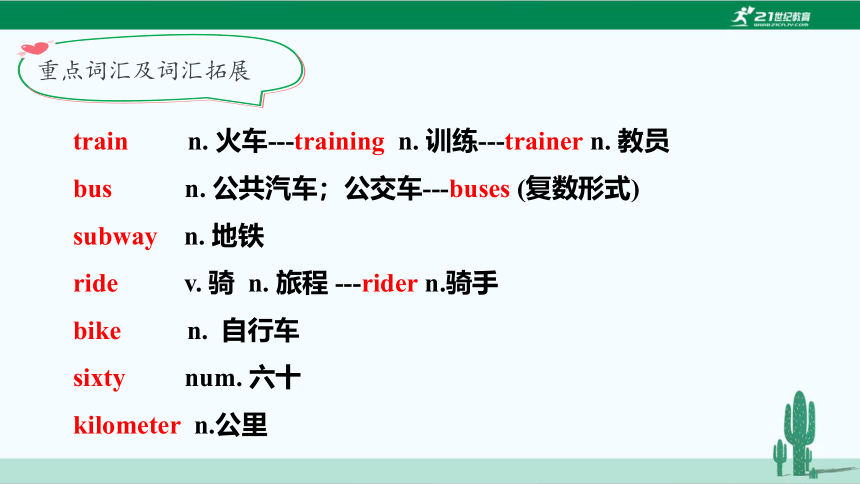

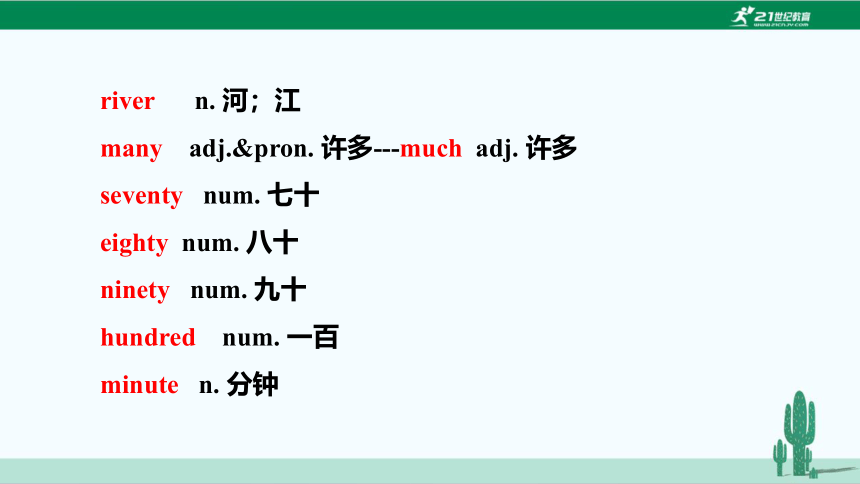
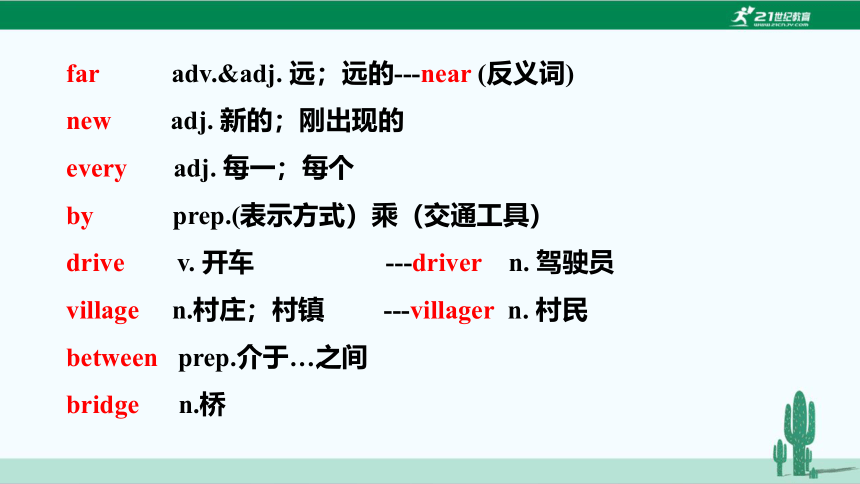
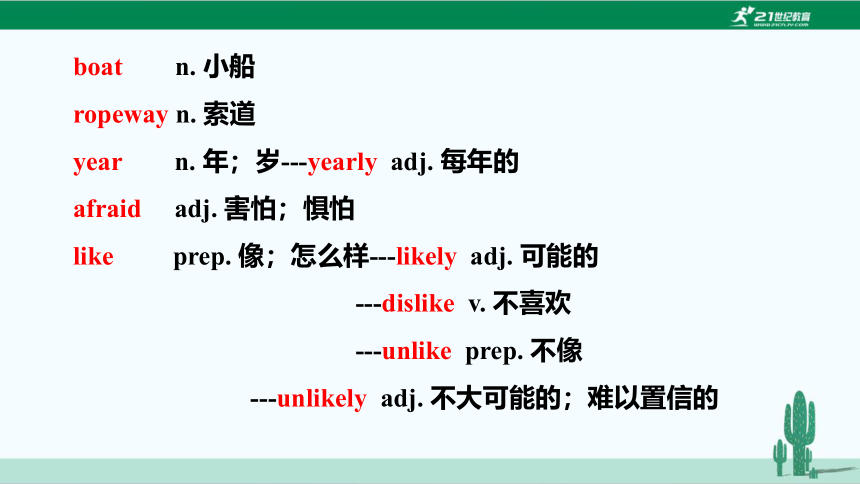
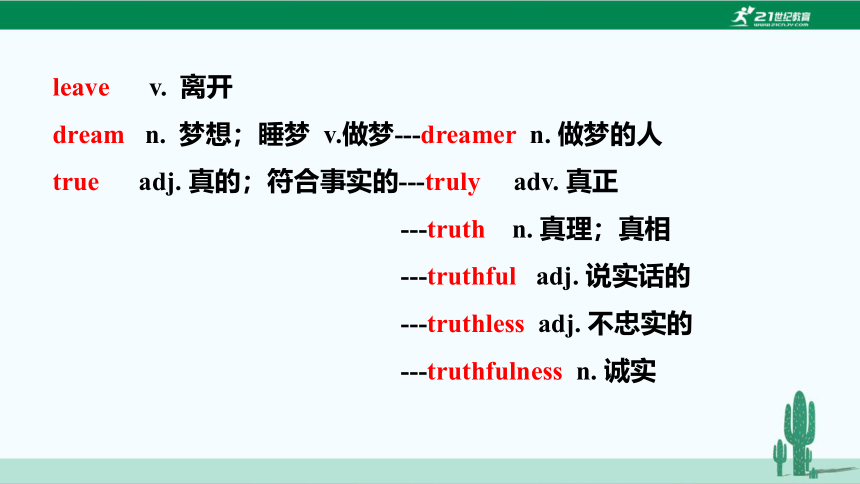
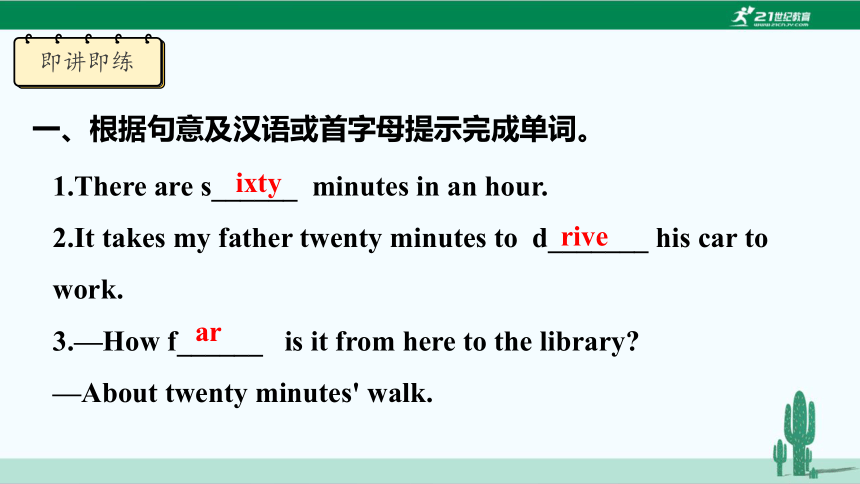
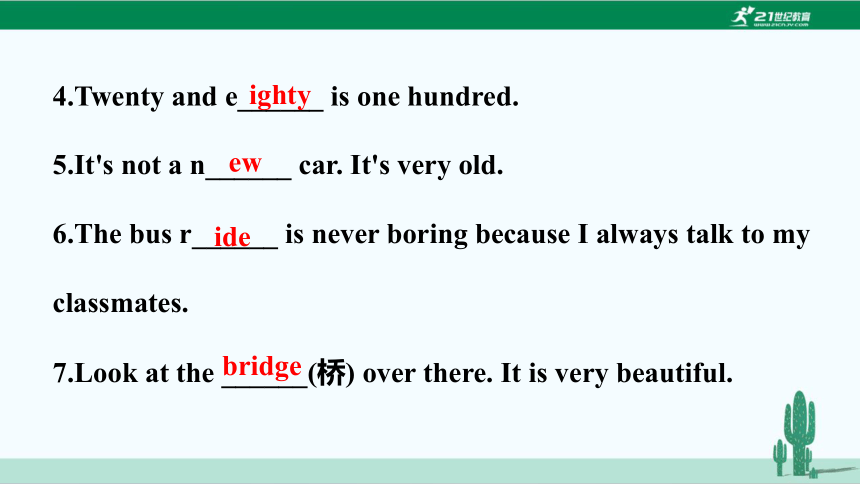

文档简介
(共72张PPT)
Unit 3 单元综合复习
人教版七年级下册
Content
词汇、短语回顾
01
重点句子回顾
02
重点词句精讲
03
语法知识精讲
04
单元话题写作
05
能力提升训练
06
目录
词汇、短语回顾
train n. 火车---training n. 训练---trainer n. 教员
bus n. 公共汽车;公交车---buses (复数形式)
subway n. 地铁
ride v. 骑 n. 旅程 ---rider n.骑手
bike n. 自行车
sixty num. 六十
kilometer n.公里
重点词汇及词汇拓展
car n. 小汽车;轿车
live v. 居住;生活---life n. 生活---lively adj. 充满活力的
---alive adj. 活着的;活泼的
---living adj. 活着的;生动的
stop n. 车站;停止
cross v. 横过;越过---crossed adj. 十字的,交叉的
---crossing n. 人行横道
---across prep.&adv. 穿过;横穿
river n. 河;江
many adj.&pron. 许多---much adj. 许多
seventy num. 七十
eighty num. 八十
ninety num. 九十
hundred num. 一百
minute n. 分钟
far adv.&adj. 远;远的---near (反义词)
new adj. 新的;刚出现的
every adj. 每一;每个
by prep.(表示方式)乘(交通工具)
drive v. 开车 ---driver n. 驾驶员
village n.村庄;村镇 ---villager n. 村民
between prep.介于…之间
bridge n.桥
boat n. 小船
ropeway n. 索道
year n. 年;岁---yearly adj. 每年的
afraid adj. 害怕;惧怕
like prep. 像;怎么样---likely adj. 可能的
---dislike v. 不喜欢
---unlike prep. 不像
---unlikely adj. 不大可能的;难以置信的
leave v. 离开
dream n. 梦想;睡梦 v.做梦---dreamer n. 做梦的人
true adj. 真的;符合事实的---truly adv. 真正
---truth n. 真理;真相
---truthful adj. 说实话的
---truthless adj. 不忠实的
---truthfulness n. 诚实
一、根据句意及汉语或首字母提示完成单词。
即讲即练
1.There are s______ minutes in an hour.
2.It takes my father twenty minutes to d_______ his car to work.
3.—How f______ is it from here to the library
—About twenty minutes' walk.
ixty
rive
ar
4.Twenty and e______ is one hundred.
5.It's not a n______ car. It's very old.
6.The bus r______ is never boring because I always talk to my classmates.
7.Look at the ______(桥) over there. It is very beautiful.
ighty
ew
ide
bridge
8.One day my________ (梦想)will come true.
9.The little girl is_______ (害怕)of dogs.
10.It's dangerous to swim in the ________ (河). You must get out of it.
11.There will be a high-speed railway _______ (在……之间) Ningbo and Zhoushan.
dream
afraid
river
between
get to school 到达学校
take the train 乘火车
take the subway 乘地铁
ride a bike 骑自行车
ten minutes’ walk / a ten-minute walk 10分钟的路
重点短语
ride the bike to school 骑自行车到学校
walk to/drive to/fly to… 步行去…/开车去…/坐飞机去…
every day 每天
in his father’s car 坐父亲的车
think of 认为
cross the river 过河
between…and… 在两者之间
on a ropeway 在索道上
love to do 喜欢做某事
an 11-year-old boy 一个11岁大的男孩
be like a father to me 像父亲一样做某事
leave for … 到某地
be afraid to do 害怕做某事
be afraid of sth / doing… 害怕做某事
come true 实现
thanks for +n. /doing sth. 为…而感谢
at about 8:00 在大约8点
即讲即练
1.我想知道她住在哪里。
I want to know _________ _____ ______ .
2.我不知道他每天怎么到学校。
I don't know _____ ____ _____ ____ _______ every day.
一、根据汉语提示完成句子。
where she lives
how he gets to school
3.你步行还是骑自行车
Do you walk ____ _____ ___ ______
4.对我来说,单独过河是很危险的。
It's dangerous for me ____ ______ _____ _______alone.
5.拥有一条宠物狗是我的梦想。
____ ___ ________ _____ have a pet dog.
It's my dream to
or ride a bike
to cross the river
重点句子回顾
1. —Hey, Dave, How do you get to school 喂,戴夫,你是如何到校的?
—I walk. How about you, Sally 我是步行到校的,萨丽,你呢?
—I ride my bike.我是骑自行车到校的。
2.—I ride it to school every day. How do you get to school 我每天骑自行车上学,你呢?
一I usually take the bus.我通常乘公交车上学.
3. How far is it from your home to school 从你家到学校有多远?
4. 一How long does it take you to get to school 你到学校要用多长时间?
—About 15 minutes by bike.骑自行车大约十五分钟。
5. —Well, have a good day at school.祝你在学校度过愉快的一天—You, too.你也是。
6. —How do you get to school 你是如何到校的?
—Well, I ride my bike to the subway station. Then I take the subway.我先骑车去地铁站,然后乘地铁去学校。
7. Do you walk or ride a bike 你是步行还是骑自行车?
8. For many students, it is easy to get to school.对于许多学生来讲,上学是挺方便的。
9. There is a very big river between their school and the village.
在他们的学校与村庄之间有一条大河。
10. There is no bridge and the river runs the quickly for boats.
(河上)完全没有桥梁,而且河水湍急,不宜小船摆渡。
重点词句精讲
1. arrive, get与reach的用法区别
arrive(in/at) 不及物动词,意为“抵达” ①arrive+地点的副词(here,there,home,abroad等)
②arrive in +大地点(国家、大城市等)
③arrive at+小地点(镇、家、店等)
get(to) 不及物动词,意为“到达” ①get+地点的副词(here,there,home等)
②get to十地点名词”
reach 及物动词,意为"到达" reach+地点名词。
eg:He arrived in Jinan yesterday.
他昨天就到济南了。
I arrived at the restaurant an hour ago.
我一个小时前到达了这家餐馆。
When/How do you get to school
你什么时候/如何到学校?
How do you get to there 你怎么去那里(去掉介词to)
They reached London last night. 他们非晚到达了伦敦。
2. take的用法
表示“拿去”“带去”等,与bring(拿来)方向相反。
Please take the empty cup away and bring me a cup of tea.
请把这个空杯拿走,给我倒杯茶来。
Please take him a cup of tea.=Please take a cup of tea to him.
请给他端杯茶去。
He took the box to the farm. 他把那个箱子带到了农场。
表示“搭乘(交通工具)”。
He decided to take a taxi to the railway station.
他决定乘出租车去火车站。
=He decided to go to the railway station by taxi.
表示“花费(时间、金钱)等”,常常和it连用,it在句子中作形式主语,真正的主语是后面的不定式。
eg:The flight will take three hours. 路上要飞3小时。
It took him five years to write the book. 他写这本书花了5年时间。
=It took five years for him to write the book.
=The book took him five years to write.
=He took five years to write the book.
表示“吃,喝,服用,放”等
eg:Take this medicine three times a day. 每天吃三次药。
Do you take sugar in your milk 你喝的牛奶里放糖吗?
【拓展】与take有关的短语:
take a walk散步 take a rest休息一下 take a look看一看
take away 拿走 take care小心!=be careful=look out take care of (好好)照顾,照料
take down 取下来 take……as example 拿……举例 take off脱下;飞机
take one’s temperature量体温 take place 发生 take sb’s place 替换
take out拿出取出 take it easy 不紧张;放松 take notes记笔记
3. ride的用法
v. 意为“乘,骑,驾”,去式为rode;现在分词为riding;过去分词为ridden。
Bob rides a bike to school every day. 鲍勃每天骑自行车上学。
n. 意为“旅行,乘骑,短途旅程,供乘骑的游乐设施”
短语:go for a ride开车兜风;give sb. a ride捎某人一程
I want to go for a ride in your new car. 我想坐你的新车去兜风。
I want to have a ride of that bike.我想骑一骑那辆自行车。
4. hundred与hundreds of
hundred(百),thousand(千),million(百万),billion(十亿)等数词,当前面有具体数字时,表示确切数目,其后不加-s,且不和of连用。
three hundred 三百 five thousand 五千 two million 二百万
若表示一个不确定的数目,前面没有具体数字,其后要加-s,且与of连用。
millions of students 数百万学生 hundreds of cars 几百辆车
billions of people 数十亿人 thousands of bees 成千上万的蜜蜂
5. every day 与 everyday
every day“每天;天天”,为副词短语,在句中作状语,一般位于句首或句末。
I go to school on foot every day. 我每天步行去上学。
He reads books every day. 他每天都看书。
everyday“每天的;日常的”,为形容词,在句中作定语,一般位于名词前面。
This is our everyday homework. 这是我们每天的家庭作业。
I study everyday English every day. 我每天学习日常英语。
6.spend,pay,cost与take
spend 及物动词,意为“花费(时间、金钱)”。指花费时间、金钱;主语为人。常用结构:sb. spend(s) time/money on sth.(或doing sth.)
take 指花费时间。常用结构:It takes sb. time to do sth.,it为形式主语。
pay 指支付、花费金钱;主语为人。常用结构:sb. pay(s) (sb.)money (for sth.)
cost 指花费金钱;主语为物。常用结构:sthcost(s) (sb. ) money
How long does it take you to get to school 你到学校花费多长时间?
We spends a lot of time (in) reading books. 我们花很多时间读书。
It took the workers only 10 days to build the Huoshenshan hospital.建造火神山医院只花了工人们10天时间。
Cleaning the garden took me half a day. 收拾花园花了我半天的时间。
I paid him 20 dollars for the book. 我付给他20美元买这本书。
I paid 30 yuan for the toy. 我支付了30元买这个玩具。
Wang Li paid 500 yuan for the bike. 王丽花500元买了这辆自行车。
The coat cost him 25 dollars. 这件外套花了他25美元。
Remembering these new words cost him a lot of time. 他花了大量时间才记住了这些单词。
7.stop
作名词时,意为“车站;停止”。
There is a bus stop near here. 这儿附近有个公共汽车站点。
作动词,意为“停止”
stop doing sth. “停下正在做的事情”
stop to do sth.“停下来去做另一件事”。
The two girls stopped talking when they saw me. 那两个女孩一见到我就停止了讲话。
The two girls stopped to talk to me when they saw me.这两个女孩一看到我就停下来和我讲话
8.cross与across
cross 作动词,意思是“穿过,越过”。
cross 作名词,意思是“十字架,十字形饰物”。
across 是介词,意思是“横跨,横穿,穿越”。
go/walk across the road 走过这条马路
We must be careful when we cross the road. 当我们过马路时,一定要小心。
They usually cross the river by boat. 他们通常乘船渡河。
through 指“穿过、通过…”,强调从物体中间穿过。穿过这道门
across 指“穿过、通过…”,强调从物体表面穿过。如过马路、过桥、过河等
over 指“越过…”,强调从物体上方越过。
past 指“经过…”,强调从物体旁边经过。
The river runs through the forest. 这条河穿过森林。
The girl runs across the road. 女孩跑过马路。
The horse jumped over the wall. 那匹马跳过了墙。
Our bus runs past this primary school. 我们的公共汽车经过这所小学。
9.between与among
① between指“在……之间”,一般指两者之间。常与and连用“between…and…”在什么与什么之间。
There is a ball between the dog and the cat.狗和猫之间有一个球.
This man is between 60 and 70. 这个人在60到70岁之间
② among指“在……之间”,一般指三者或三者以上之间。
The teacher is sitting among the tables. 老师正坐在桌子中间.
The house is among the trees. 房子在树中间。
10.11-year-old boy
“基数词+名词+形容词”,词与词之间用连字符连接,相当于一个复合形容词,一般用在名词前作定语,其中的名词必须用单数。
One 11-year-old boy, Liangliang, crosses the river every school day.亮亮是一个11岁的男孩儿,每个上学日他都要过河。
Jane is a 16-year-old high school student in the United States. 简是一名16岁的美国中学生。
Lily is a 10-years-old girl. 丽丽是一个10岁的女孩儿。(×)
11.afraid的用法
afraid形容词,意为“害帕;畏惧”。
◆ be afraid of sth (sb) 害怕某事(某人)。
◆ be afraid of doing sth. 担心会发生某事或某情况;害怕做某事或不敢做某事(指缺乏勇气或害怕其后果而不敢)。
◆ be afraid to do sth 害怕做某事或不敢做某事。
But he is not afraid because he loves school. 但是他并不害怕,因为他喜欢上学。
Are you afraid of dogs 你害狗吗
He is afraid of her. 他怕她。
She was afraid of waking her husband. 她怕吵醒她丈夫。
I was afraid of hurting her feelings. 我怕伤害她的感情。
He was afraid of jumping. 他不敢跳。
He was afraid to fly in a plane. 他不敢坐飞机。
He was afraid to go into the house and meet his father. 他不敢进屋去见他父亲。
12.like的用法
like作实义动词,意为“喜欢”
like sth./ doing sth. 后跟名词/动名词 “喜欢某事/做某事”
I like bananas. 我喜欢香蕉。
He likes playing basketball. 他喜欢打篮球。
like to do sth. 喜欢做某事
I like to play the piano. 我喜欢弹钢琴。
like用作介词,be like,look like后接名词或代词作宾语,意为“像……;跟……一样”。feel like+v-ing形式、代词或名词,意为“想要做某事”。
eg:What is he like 他是怎么样的一个人?
The little girl looks like her father.那个小姑娘看起来像她的父亲。
Do you feel like having a rest 你想休息吗?
We’ll go for a walk if you feel like it. 如果你想散步,我们就去吧。
13.leave的用法
用作及物动词,意为“离开”,用作不及物动词时,常与介词for连用①“leave+地点” 表示“离开某地”
②“leave for+地点”表示“动身去某地”
③“leave+地点+for+地点”表示“离开某地去某地”。
④“leave sth +地点”指的是把某物落在某处,切记不能用forget。
Many of the students and villagers never leave the village.许多学生和村民从未离开过村庄。
When did you leave Shanghai 你什么时候离开上海的?
Next Friday. Alice is leaving for London. 下周五。爱丽丝要去伦敦了。
Why are you leaving Shanghai for Beijing 你为什么要离开上海去北京?
She left her book at home yesterday. 她昨天把书忘在家里了。
14.thanks for
“Thank you for……”意为“因为……而感谢”等于“Thanks for……”。后接名词、代词或动词-ing形式。thank sb. for sth.“因为某事感谢某人”;thank sb. for doing sth. “因为做某事而感谢某人”
Thank you for your birthday present. 谢谢你的生日礼物。
=Thanks for your birthday present.
Thank you for your help. 谢谢你帮助我。=Thank you for helping me.
Thank you for telling me the way to the park. 谢谢你告诉我去公园的路。
语法知识精讲
一、how引导的特殊疑问句
询问别人的意见感受、程度、看法等,意为“…怎么样?”。
eg:—How do you like the music? 你觉得这首乐曲如何?
—I like it very much.我非常喜欢它。
How do you like China?你认为中国怎么样?
询问身体健康状况,意为“……怎么样?”。
eg:How do you do?你好!
How are you?你(身体)好吗?
how以及how词组引导的特殊疑问句
how提问交通方式。其答语分三种情况:
◆ take a/the+表示交通工具的名词
◆ by +表示交通工具的单数名词
◆ on/in+限定词+表示交通工具的名词
eg:How do you go to work every day 你每天怎样去上班?
I take the subway to work. 我乘地铁去上班。
=I go to work by subway.
=I go to work in the subway.
二、how词组引导的特殊疑问句
how about用于询问或征询意见等,相当于what about,后接名词、代词或动词的-ing形式,意为“……怎么样?”。
eg:I like playing football. How/What about you 我喜欢踢足球。你呢?
问年龄/问数量/问价钱/问高度/问天气。
How old are you?你多大了?
How many players are there in a team?一个队有几名队员?
How much bread is there on the table?桌子上有多少面包?
How much is this coat?这件外套多少钱?
How high is the mountain?这座山有多高?
How tall is the girl?这女孩儿有多高?
How is the weather in Beijing?北京的天气怎么样?
How is the weather in winter?冬天的气候怎样?
how long用来提问时间长短,意为“多长时间",也可以用来提问物体长度意为“多长”
eg:—How long does it take you to finish your homework 完成你的作业花费你多长时间?
—It takes me an hour to finish my homework. 完成作业花费我一个小时的时间。
—How long is this ruler?
—It is 20 cm long. 20cm长
how far用来提问距离,意为“多远"。其答语分为两种
◆ 用长度单位表示。
eg:—How far is it from your home to the bus stop 从你家到公共汽车站点有多远?
—It's five kilometers. 5千米。
◆ 用时间表示。
—How far is the park from the supermarket 从超市到公园有多远?
—It's ten minutes' walk. 步行10分钟的路程。
how often询问动作发生的频率,意为“多久一次”。
eg:—How often do you visit your grandparents 你多久看望你的(外)祖父母一次?
—Once a week. 一周一次。
( ) 1. He often goes to work _______ his car.
A. by B. at C. to D. in
( ) 2. — Peter, how far is it from your home to school
— It’s only five _______ on foot.
A. minute B. minutes C. minute’s D. minutes
一、单项选择。
即讲即练
D
B
1. Her cousin drives his car to work. (改为同义句)
Her cousin goes to work ______ ______ .
2. Do your friends go to school by bus (作肯定回答)
______ , ______ ______ .
3. Jane rides her bike to school with me. (改为一般疑问句)
______ Jane ______ her bike to school with you
二、用括号内所给单词的适当形式填空。
by car
Yes they do
Does ride
4. It is about 150 kilometers from Beijing to Tianjin. (对画线部分提问)
_______ _______ is it from Beijing to Tianjin
5. It takes her fifteen minutes to get to school. (对画线部分提问)
_______ _______ does it take her to get to school
How far
How long
6. I usually spend 40 minutes going to school by bike.(改为同义句)
It usually _______ _______ 40 minutes _______ _______ to school by bike.
takes
me
to
go
单元话题写作
单元话题写作
单元写作目标
此单元以“谈论如何到达某地”为话题,要求同学们能描述人们去上班或学生去上学所使用的交通方式、路程、所花费的时间、感受及对未来出行方式的憧憬。通过写作训练,学生能用take the train/walk/ride a bike/drive a car/by subway/on foot等短语描述使用的交通工具;也能用数词和特殊疑问句描述花费的时间或路程并拓展写作内容。
素材积累
相关词汇:
1.到达 get to
2.乘地铁/公交 take the subway/bus
3.骑自行车 ride a bike
4.步行 walk to… /go to … on foot
5.认为;想起 think of
6.五分钟的路程 five minutes’ walk
相关句型:
开头句
1.It’s easy for me to get to school.
2.You want to know how I get to school, right
中间句
1.It’s about two kilometers from my home to my school.
2.It takes twenty-five minutes to get there.
结尾句
1.I like going to school by bike because it’s good exercise.
2.It is interesting for me to take the bus to school.
范例
英语课上,老师请大家介绍自己或家人上学或上班的方式。假如你是李华,请根据下表中的内容,写一篇发言稿,可适当发挥,60词左右。
工作/学习地点 离家距离 上班方式 用时
李华的父亲 医院 开车 半小时
李华的母亲 超市 2公里 步行
李华 学校 3公里 乘公交车 20分钟
审题:
1.文体:记叙文
2.时态:一般现在时
3.人称:第一人称
要点提取:介绍自己和家人上学或上班的方式。
Hi, boys and girls. I’m Li Hua. Now let me tell you how my family go to work and how I get to school.
My father works at a hospital. It is far from our home. My father drives to work. It takes him about half an hour to get there every day. My mother works at a supermarket. It’s only two kilometers from our home. She always walks there. Walking to the supermarket is good exercise. My school is three kilometers from my home. I go to school by bus. It usually takes me twenty minutes to get to school.
Do you like our ways to go to work or school How do your family go to school or work Can you tell me
能力提升训练
一、用括号内所给单词的适当形式填空。
1. It’s ten ___________(kilometer) from the bus station to
my school.
2. What does your friend ________(think) of the book
3. There are two ________(boat) in the river.
kilometers
boats
think
4. Jane ________(cross) the bridge to school every day.
5. The students are all from one ________(village).
6. Half an hour is thirty ___________(minute).
7. Sally usually __________(drive) to work.
minutes
crosses
village
drives
二、根据括号内的要求完成下列各题,每空一词。
1. They go to work by bike every day. (改为一般疑问句)
________ they ________ to work by bike every day
2. Does Dave play basketball after school (作否定回答)
________, he ________.
Do go
No doesn’t
3. The boy usually gets to school on foot. (改为同义句)
The boy usually ________ ________ school.
4. It takes about an hour to get to the library. (对画线部分提问)
________ ________ does it take to get to the library
5. Mary goes to the train station by subway. (对画线部分提问)
________ ________ Mary go to the train station
walks to
How does
How long
三、书面表达
假如Bob是你的朋友,他是一名学生,他父母在同一家服装店上班。根据下面表格中的内容用英语写一篇短文描述他一家人上学及上班的情况。
要求:1. 必须包括表格内所有信息;
2. 60词左右,可适当发挥。
Who Bob Bob’s parents
Where From home to school From home to the store
How By bike By bus
How far About 2 km About 10 km
How long About 15 minutes About 30 minutes
One possible version:
Bob is my friend. He is a student. He lives about 2 kilometers from school. He rides his bike to school every day and it takes him about 15 minutes. But sometimes, he goes to school by bus. His parents work in a clothes store. It’s about 10 kilometers from their home to the store. They usually take the bus to work. It takes them about 30 minutes.
谢谢
21世纪教育网(www.21cnjy.com)
中小学教育资源网站
兼职招聘:
https://www.21cnjy.com/recruitment/home/admin
Unit 3 单元综合复习
人教版七年级下册
Content
词汇、短语回顾
01
重点句子回顾
02
重点词句精讲
03
语法知识精讲
04
单元话题写作
05
能力提升训练
06
目录
词汇、短语回顾
train n. 火车---training n. 训练---trainer n. 教员
bus n. 公共汽车;公交车---buses (复数形式)
subway n. 地铁
ride v. 骑 n. 旅程 ---rider n.骑手
bike n. 自行车
sixty num. 六十
kilometer n.公里
重点词汇及词汇拓展
car n. 小汽车;轿车
live v. 居住;生活---life n. 生活---lively adj. 充满活力的
---alive adj. 活着的;活泼的
---living adj. 活着的;生动的
stop n. 车站;停止
cross v. 横过;越过---crossed adj. 十字的,交叉的
---crossing n. 人行横道
---across prep.&adv. 穿过;横穿
river n. 河;江
many adj.&pron. 许多---much adj. 许多
seventy num. 七十
eighty num. 八十
ninety num. 九十
hundred num. 一百
minute n. 分钟
far adv.&adj. 远;远的---near (反义词)
new adj. 新的;刚出现的
every adj. 每一;每个
by prep.(表示方式)乘(交通工具)
drive v. 开车 ---driver n. 驾驶员
village n.村庄;村镇 ---villager n. 村民
between prep.介于…之间
bridge n.桥
boat n. 小船
ropeway n. 索道
year n. 年;岁---yearly adj. 每年的
afraid adj. 害怕;惧怕
like prep. 像;怎么样---likely adj. 可能的
---dislike v. 不喜欢
---unlike prep. 不像
---unlikely adj. 不大可能的;难以置信的
leave v. 离开
dream n. 梦想;睡梦 v.做梦---dreamer n. 做梦的人
true adj. 真的;符合事实的---truly adv. 真正
---truth n. 真理;真相
---truthful adj. 说实话的
---truthless adj. 不忠实的
---truthfulness n. 诚实
一、根据句意及汉语或首字母提示完成单词。
即讲即练
1.There are s______ minutes in an hour.
2.It takes my father twenty minutes to d_______ his car to work.
3.—How f______ is it from here to the library
—About twenty minutes' walk.
ixty
rive
ar
4.Twenty and e______ is one hundred.
5.It's not a n______ car. It's very old.
6.The bus r______ is never boring because I always talk to my classmates.
7.Look at the ______(桥) over there. It is very beautiful.
ighty
ew
ide
bridge
8.One day my________ (梦想)will come true.
9.The little girl is_______ (害怕)of dogs.
10.It's dangerous to swim in the ________ (河). You must get out of it.
11.There will be a high-speed railway _______ (在……之间) Ningbo and Zhoushan.
dream
afraid
river
between
get to school 到达学校
take the train 乘火车
take the subway 乘地铁
ride a bike 骑自行车
ten minutes’ walk / a ten-minute walk 10分钟的路
重点短语
ride the bike to school 骑自行车到学校
walk to/drive to/fly to… 步行去…/开车去…/坐飞机去…
every day 每天
in his father’s car 坐父亲的车
think of 认为
cross the river 过河
between…and… 在两者之间
on a ropeway 在索道上
love to do 喜欢做某事
an 11-year-old boy 一个11岁大的男孩
be like a father to me 像父亲一样做某事
leave for … 到某地
be afraid to do 害怕做某事
be afraid of sth / doing… 害怕做某事
come true 实现
thanks for +n. /doing sth. 为…而感谢
at about 8:00 在大约8点
即讲即练
1.我想知道她住在哪里。
I want to know _________ _____ ______ .
2.我不知道他每天怎么到学校。
I don't know _____ ____ _____ ____ _______ every day.
一、根据汉语提示完成句子。
where she lives
how he gets to school
3.你步行还是骑自行车
Do you walk ____ _____ ___ ______
4.对我来说,单独过河是很危险的。
It's dangerous for me ____ ______ _____ _______alone.
5.拥有一条宠物狗是我的梦想。
____ ___ ________ _____ have a pet dog.
It's my dream to
or ride a bike
to cross the river
重点句子回顾
1. —Hey, Dave, How do you get to school 喂,戴夫,你是如何到校的?
—I walk. How about you, Sally 我是步行到校的,萨丽,你呢?
—I ride my bike.我是骑自行车到校的。
2.—I ride it to school every day. How do you get to school 我每天骑自行车上学,你呢?
一I usually take the bus.我通常乘公交车上学.
3. How far is it from your home to school 从你家到学校有多远?
4. 一How long does it take you to get to school 你到学校要用多长时间?
—About 15 minutes by bike.骑自行车大约十五分钟。
5. —Well, have a good day at school.祝你在学校度过愉快的一天—You, too.你也是。
6. —How do you get to school 你是如何到校的?
—Well, I ride my bike to the subway station. Then I take the subway.我先骑车去地铁站,然后乘地铁去学校。
7. Do you walk or ride a bike 你是步行还是骑自行车?
8. For many students, it is easy to get to school.对于许多学生来讲,上学是挺方便的。
9. There is a very big river between their school and the village.
在他们的学校与村庄之间有一条大河。
10. There is no bridge and the river runs the quickly for boats.
(河上)完全没有桥梁,而且河水湍急,不宜小船摆渡。
重点词句精讲
1. arrive, get与reach的用法区别
arrive(in/at) 不及物动词,意为“抵达” ①arrive+地点的副词(here,there,home,abroad等)
②arrive in +大地点(国家、大城市等)
③arrive at+小地点(镇、家、店等)
get(to) 不及物动词,意为“到达” ①get+地点的副词(here,there,home等)
②get to十地点名词”
reach 及物动词,意为"到达" reach+地点名词。
eg:He arrived in Jinan yesterday.
他昨天就到济南了。
I arrived at the restaurant an hour ago.
我一个小时前到达了这家餐馆。
When/How do you get to school
你什么时候/如何到学校?
How do you get to there 你怎么去那里(去掉介词to)
They reached London last night. 他们非晚到达了伦敦。
2. take的用法
表示“拿去”“带去”等,与bring(拿来)方向相反。
Please take the empty cup away and bring me a cup of tea.
请把这个空杯拿走,给我倒杯茶来。
Please take him a cup of tea.=Please take a cup of tea to him.
请给他端杯茶去。
He took the box to the farm. 他把那个箱子带到了农场。
表示“搭乘(交通工具)”。
He decided to take a taxi to the railway station.
他决定乘出租车去火车站。
=He decided to go to the railway station by taxi.
表示“花费(时间、金钱)等”,常常和it连用,it在句子中作形式主语,真正的主语是后面的不定式。
eg:The flight will take three hours. 路上要飞3小时。
It took him five years to write the book. 他写这本书花了5年时间。
=It took five years for him to write the book.
=The book took him five years to write.
=He took five years to write the book.
表示“吃,喝,服用,放”等
eg:Take this medicine three times a day. 每天吃三次药。
Do you take sugar in your milk 你喝的牛奶里放糖吗?
【拓展】与take有关的短语:
take a walk散步 take a rest休息一下 take a look看一看
take away 拿走 take care小心!=be careful=look out take care of (好好)照顾,照料
take down 取下来 take……as example 拿……举例 take off脱下;飞机
take one’s temperature量体温 take place 发生 take sb’s place 替换
take out拿出取出 take it easy 不紧张;放松 take notes记笔记
3. ride的用法
v. 意为“乘,骑,驾”,去式为rode;现在分词为riding;过去分词为ridden。
Bob rides a bike to school every day. 鲍勃每天骑自行车上学。
n. 意为“旅行,乘骑,短途旅程,供乘骑的游乐设施”
短语:go for a ride开车兜风;give sb. a ride捎某人一程
I want to go for a ride in your new car. 我想坐你的新车去兜风。
I want to have a ride of that bike.我想骑一骑那辆自行车。
4. hundred与hundreds of
hundred(百),thousand(千),million(百万),billion(十亿)等数词,当前面有具体数字时,表示确切数目,其后不加-s,且不和of连用。
three hundred 三百 five thousand 五千 two million 二百万
若表示一个不确定的数目,前面没有具体数字,其后要加-s,且与of连用。
millions of students 数百万学生 hundreds of cars 几百辆车
billions of people 数十亿人 thousands of bees 成千上万的蜜蜂
5. every day 与 everyday
every day“每天;天天”,为副词短语,在句中作状语,一般位于句首或句末。
I go to school on foot every day. 我每天步行去上学。
He reads books every day. 他每天都看书。
everyday“每天的;日常的”,为形容词,在句中作定语,一般位于名词前面。
This is our everyday homework. 这是我们每天的家庭作业。
I study everyday English every day. 我每天学习日常英语。
6.spend,pay,cost与take
spend 及物动词,意为“花费(时间、金钱)”。指花费时间、金钱;主语为人。常用结构:sb. spend(s) time/money on sth.(或doing sth.)
take 指花费时间。常用结构:It takes sb. time to do sth.,it为形式主语。
pay 指支付、花费金钱;主语为人。常用结构:sb. pay(s) (sb.)money (for sth.)
cost 指花费金钱;主语为物。常用结构:sthcost(s) (sb. ) money
How long does it take you to get to school 你到学校花费多长时间?
We spends a lot of time (in) reading books. 我们花很多时间读书。
It took the workers only 10 days to build the Huoshenshan hospital.建造火神山医院只花了工人们10天时间。
Cleaning the garden took me half a day. 收拾花园花了我半天的时间。
I paid him 20 dollars for the book. 我付给他20美元买这本书。
I paid 30 yuan for the toy. 我支付了30元买这个玩具。
Wang Li paid 500 yuan for the bike. 王丽花500元买了这辆自行车。
The coat cost him 25 dollars. 这件外套花了他25美元。
Remembering these new words cost him a lot of time. 他花了大量时间才记住了这些单词。
7.stop
作名词时,意为“车站;停止”。
There is a bus stop near here. 这儿附近有个公共汽车站点。
作动词,意为“停止”
stop doing sth. “停下正在做的事情”
stop to do sth.“停下来去做另一件事”。
The two girls stopped talking when they saw me. 那两个女孩一见到我就停止了讲话。
The two girls stopped to talk to me when they saw me.这两个女孩一看到我就停下来和我讲话
8.cross与across
cross 作动词,意思是“穿过,越过”。
cross 作名词,意思是“十字架,十字形饰物”。
across 是介词,意思是“横跨,横穿,穿越”。
go/walk across the road 走过这条马路
We must be careful when we cross the road. 当我们过马路时,一定要小心。
They usually cross the river by boat. 他们通常乘船渡河。
through 指“穿过、通过…”,强调从物体中间穿过。穿过这道门
across 指“穿过、通过…”,强调从物体表面穿过。如过马路、过桥、过河等
over 指“越过…”,强调从物体上方越过。
past 指“经过…”,强调从物体旁边经过。
The river runs through the forest. 这条河穿过森林。
The girl runs across the road. 女孩跑过马路。
The horse jumped over the wall. 那匹马跳过了墙。
Our bus runs past this primary school. 我们的公共汽车经过这所小学。
9.between与among
① between指“在……之间”,一般指两者之间。常与and连用“between…and…”在什么与什么之间。
There is a ball between the dog and the cat.狗和猫之间有一个球.
This man is between 60 and 70. 这个人在60到70岁之间
② among指“在……之间”,一般指三者或三者以上之间。
The teacher is sitting among the tables. 老师正坐在桌子中间.
The house is among the trees. 房子在树中间。
10.11-year-old boy
“基数词+名词+形容词”,词与词之间用连字符连接,相当于一个复合形容词,一般用在名词前作定语,其中的名词必须用单数。
One 11-year-old boy, Liangliang, crosses the river every school day.亮亮是一个11岁的男孩儿,每个上学日他都要过河。
Jane is a 16-year-old high school student in the United States. 简是一名16岁的美国中学生。
Lily is a 10-years-old girl. 丽丽是一个10岁的女孩儿。(×)
11.afraid的用法
afraid形容词,意为“害帕;畏惧”。
◆ be afraid of sth (sb) 害怕某事(某人)。
◆ be afraid of doing sth. 担心会发生某事或某情况;害怕做某事或不敢做某事(指缺乏勇气或害怕其后果而不敢)。
◆ be afraid to do sth 害怕做某事或不敢做某事。
But he is not afraid because he loves school. 但是他并不害怕,因为他喜欢上学。
Are you afraid of dogs 你害狗吗
He is afraid of her. 他怕她。
She was afraid of waking her husband. 她怕吵醒她丈夫。
I was afraid of hurting her feelings. 我怕伤害她的感情。
He was afraid of jumping. 他不敢跳。
He was afraid to fly in a plane. 他不敢坐飞机。
He was afraid to go into the house and meet his father. 他不敢进屋去见他父亲。
12.like的用法
like作实义动词,意为“喜欢”
like sth./ doing sth. 后跟名词/动名词 “喜欢某事/做某事”
I like bananas. 我喜欢香蕉。
He likes playing basketball. 他喜欢打篮球。
like to do sth. 喜欢做某事
I like to play the piano. 我喜欢弹钢琴。
like用作介词,be like,look like后接名词或代词作宾语,意为“像……;跟……一样”。feel like+v-ing形式、代词或名词,意为“想要做某事”。
eg:What is he like 他是怎么样的一个人?
The little girl looks like her father.那个小姑娘看起来像她的父亲。
Do you feel like having a rest 你想休息吗?
We’ll go for a walk if you feel like it. 如果你想散步,我们就去吧。
13.leave的用法
用作及物动词,意为“离开”,用作不及物动词时,常与介词for连用①“leave+地点” 表示“离开某地”
②“leave for+地点”表示“动身去某地”
③“leave+地点+for+地点”表示“离开某地去某地”。
④“leave sth +地点”指的是把某物落在某处,切记不能用forget。
Many of the students and villagers never leave the village.许多学生和村民从未离开过村庄。
When did you leave Shanghai 你什么时候离开上海的?
Next Friday. Alice is leaving for London. 下周五。爱丽丝要去伦敦了。
Why are you leaving Shanghai for Beijing 你为什么要离开上海去北京?
She left her book at home yesterday. 她昨天把书忘在家里了。
14.thanks for
“Thank you for……”意为“因为……而感谢”等于“Thanks for……”。后接名词、代词或动词-ing形式。thank sb. for sth.“因为某事感谢某人”;thank sb. for doing sth. “因为做某事而感谢某人”
Thank you for your birthday present. 谢谢你的生日礼物。
=Thanks for your birthday present.
Thank you for your help. 谢谢你帮助我。=Thank you for helping me.
Thank you for telling me the way to the park. 谢谢你告诉我去公园的路。
语法知识精讲
一、how引导的特殊疑问句
询问别人的意见感受、程度、看法等,意为“…怎么样?”。
eg:—How do you like the music? 你觉得这首乐曲如何?
—I like it very much.我非常喜欢它。
How do you like China?你认为中国怎么样?
询问身体健康状况,意为“……怎么样?”。
eg:How do you do?你好!
How are you?你(身体)好吗?
how以及how词组引导的特殊疑问句
how提问交通方式。其答语分三种情况:
◆ take a/the+表示交通工具的名词
◆ by +表示交通工具的单数名词
◆ on/in+限定词+表示交通工具的名词
eg:How do you go to work every day 你每天怎样去上班?
I take the subway to work. 我乘地铁去上班。
=I go to work by subway.
=I go to work in the subway.
二、how词组引导的特殊疑问句
how about用于询问或征询意见等,相当于what about,后接名词、代词或动词的-ing形式,意为“……怎么样?”。
eg:I like playing football. How/What about you 我喜欢踢足球。你呢?
问年龄/问数量/问价钱/问高度/问天气。
How old are you?你多大了?
How many players are there in a team?一个队有几名队员?
How much bread is there on the table?桌子上有多少面包?
How much is this coat?这件外套多少钱?
How high is the mountain?这座山有多高?
How tall is the girl?这女孩儿有多高?
How is the weather in Beijing?北京的天气怎么样?
How is the weather in winter?冬天的气候怎样?
how long用来提问时间长短,意为“多长时间",也可以用来提问物体长度意为“多长”
eg:—How long does it take you to finish your homework 完成你的作业花费你多长时间?
—It takes me an hour to finish my homework. 完成作业花费我一个小时的时间。
—How long is this ruler?
—It is 20 cm long. 20cm长
how far用来提问距离,意为“多远"。其答语分为两种
◆ 用长度单位表示。
eg:—How far is it from your home to the bus stop 从你家到公共汽车站点有多远?
—It's five kilometers. 5千米。
◆ 用时间表示。
—How far is the park from the supermarket 从超市到公园有多远?
—It's ten minutes' walk. 步行10分钟的路程。
how often询问动作发生的频率,意为“多久一次”。
eg:—How often do you visit your grandparents 你多久看望你的(外)祖父母一次?
—Once a week. 一周一次。
( ) 1. He often goes to work _______ his car.
A. by B. at C. to D. in
( ) 2. — Peter, how far is it from your home to school
— It’s only five _______ on foot.
A. minute B. minutes C. minute’s D. minutes
一、单项选择。
即讲即练
D
B
1. Her cousin drives his car to work. (改为同义句)
Her cousin goes to work ______ ______ .
2. Do your friends go to school by bus (作肯定回答)
______ , ______ ______ .
3. Jane rides her bike to school with me. (改为一般疑问句)
______ Jane ______ her bike to school with you
二、用括号内所给单词的适当形式填空。
by car
Yes they do
Does ride
4. It is about 150 kilometers from Beijing to Tianjin. (对画线部分提问)
_______ _______ is it from Beijing to Tianjin
5. It takes her fifteen minutes to get to school. (对画线部分提问)
_______ _______ does it take her to get to school
How far
How long
6. I usually spend 40 minutes going to school by bike.(改为同义句)
It usually _______ _______ 40 minutes _______ _______ to school by bike.
takes
me
to
go
单元话题写作
单元话题写作
单元写作目标
此单元以“谈论如何到达某地”为话题,要求同学们能描述人们去上班或学生去上学所使用的交通方式、路程、所花费的时间、感受及对未来出行方式的憧憬。通过写作训练,学生能用take the train/walk/ride a bike/drive a car/by subway/on foot等短语描述使用的交通工具;也能用数词和特殊疑问句描述花费的时间或路程并拓展写作内容。
素材积累
相关词汇:
1.到达 get to
2.乘地铁/公交 take the subway/bus
3.骑自行车 ride a bike
4.步行 walk to… /go to … on foot
5.认为;想起 think of
6.五分钟的路程 five minutes’ walk
相关句型:
开头句
1.It’s easy for me to get to school.
2.You want to know how I get to school, right
中间句
1.It’s about two kilometers from my home to my school.
2.It takes twenty-five minutes to get there.
结尾句
1.I like going to school by bike because it’s good exercise.
2.It is interesting for me to take the bus to school.
范例
英语课上,老师请大家介绍自己或家人上学或上班的方式。假如你是李华,请根据下表中的内容,写一篇发言稿,可适当发挥,60词左右。
工作/学习地点 离家距离 上班方式 用时
李华的父亲 医院 开车 半小时
李华的母亲 超市 2公里 步行
李华 学校 3公里 乘公交车 20分钟
审题:
1.文体:记叙文
2.时态:一般现在时
3.人称:第一人称
要点提取:介绍自己和家人上学或上班的方式。
Hi, boys and girls. I’m Li Hua. Now let me tell you how my family go to work and how I get to school.
My father works at a hospital. It is far from our home. My father drives to work. It takes him about half an hour to get there every day. My mother works at a supermarket. It’s only two kilometers from our home. She always walks there. Walking to the supermarket is good exercise. My school is three kilometers from my home. I go to school by bus. It usually takes me twenty minutes to get to school.
Do you like our ways to go to work or school How do your family go to school or work Can you tell me
能力提升训练
一、用括号内所给单词的适当形式填空。
1. It’s ten ___________(kilometer) from the bus station to
my school.
2. What does your friend ________(think) of the book
3. There are two ________(boat) in the river.
kilometers
boats
think
4. Jane ________(cross) the bridge to school every day.
5. The students are all from one ________(village).
6. Half an hour is thirty ___________(minute).
7. Sally usually __________(drive) to work.
minutes
crosses
village
drives
二、根据括号内的要求完成下列各题,每空一词。
1. They go to work by bike every day. (改为一般疑问句)
________ they ________ to work by bike every day
2. Does Dave play basketball after school (作否定回答)
________, he ________.
Do go
No doesn’t
3. The boy usually gets to school on foot. (改为同义句)
The boy usually ________ ________ school.
4. It takes about an hour to get to the library. (对画线部分提问)
________ ________ does it take to get to the library
5. Mary goes to the train station by subway. (对画线部分提问)
________ ________ Mary go to the train station
walks to
How does
How long
三、书面表达
假如Bob是你的朋友,他是一名学生,他父母在同一家服装店上班。根据下面表格中的内容用英语写一篇短文描述他一家人上学及上班的情况。
要求:1. 必须包括表格内所有信息;
2. 60词左右,可适当发挥。
Who Bob Bob’s parents
Where From home to school From home to the store
How By bike By bus
How far About 2 km About 10 km
How long About 15 minutes About 30 minutes
One possible version:
Bob is my friend. He is a student. He lives about 2 kilometers from school. He rides his bike to school every day and it takes him about 15 minutes. But sometimes, he goes to school by bus. His parents work in a clothes store. It’s about 10 kilometers from their home to the store. They usually take the bus to work. It takes them about 30 minutes.
谢谢
21世纪教育网(www.21cnjy.com)
中小学教育资源网站
兼职招聘:
https://www.21cnjy.com/recruitment/home/admin
同课章节目录
- Unit 1 Can you play the guitar?
- Section A
- Section B
- Unit 2 What time do you go to school?
- Section A
- Section B
- Unit 3 How do you get to school?
- Section A
- Section B
- Unit 4 Don't eat in class.
- Section A
- Section B
- Unit 5 Why do you like pandas?
- Section A
- Section B
- Unit 6 I'm watching TV.
- Section A
- Section B
- Review of Units 1-6
- Unit 7 It's raining!
- Section A
- Section B
- Unit 8 Is there a post office near here?
- Section A
- Section B
- Unit 9 What does he look like?
- Section A
- Section B
- Unit 10 I'd like some noodles.
- Section A
- Section B
- Unit 11 How was your school trip?
- Section A
- Section B
- Unit 12 What did you do last weekend?
- Section A
- Section B
